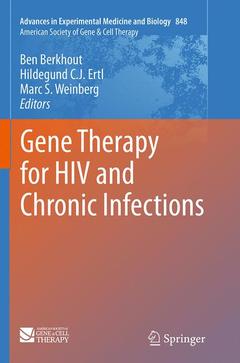Gene Therapy for HIV and Chronic Infections, Softcover reprint of the original 1st ed. 2015 American Society of Gene & Cell Therapy Series
Coordonnateurs : Berkhout Ben, Ertl Hildegund C.J., Weinberg Marc S.

Gene Therapies for Hepatitis C Virus.- Recent Advances in Use of Gene Therapy to Treat Hepatitis B Virus Infection.- U1interference (U1i) for antiviral approaches.- Gene therapy strategies to block HIV-1 replication by RNA interference.- HIV and Ribozymes.- Editing CCR5: a novel approach to HIV gene therapy.- Synthetic DNA approach to Cytomegalovirus vaccine/immune therapy.- Vector-mediated antibody gene transfer for infectious diseases.- HIV latency and the non-coding RNA therapeutic landscape.- C peptides as entry inhibitors for gene therapy.- Aptamer-siRNA chimeras for HIV
Ben Berkhout is Head of the Laboratory of Experimental Virology at the Academic Medical Center (AMC) of the University of Amsterdam (the Netherlands), where he is Professor of Virology. Ben received his Ph.D. in 1986 at the University of Leiden on gene regulation in the RNA bacteriophage MS2. He did post-doctoral training at the Dana Farber Cancer Institute, Harvard Medical School (Boston) and the National Institutes of Health, Laboratory of Molecular Microbiology (Bethesda). He moved back to the Netherlands in 1991 to set up HIV-1 research at the University of Amsterdam. Ben has published over 440 scientific papers that were cited more than 14500 times, yielding an H-index of 62. He is currently editor of several journals (e.g. Retrovirology, Virus Research, Journal of Biomedical Science) and editorial board member of many more. His current research includes basic RNA studies (new RNAi mechanisms, structure and function of HIV-1 RNA) and applied research (RNAi-based gene therapy for HIV-AIDS, novel live-attenuated vaccine designs).
Hildegund C. J. Ertl is a Professor at the Wistar Institute where she serves as the Director of the Wistar Vaccine Center. She is an Adjunct Professor in Pathology at the University of Pennsylvania and an Adjunct Professor in Pediatrics at the Children’s Hospital of Philadelphia. She obtained her MD in 1977 from the George-August University in Göttingen, Germany and did her postdoctoral studies at the John Curtin School in Canberra, Australia. She was an Assistant Professor at the Dana Farber Cancer Institute in Boston, MA and then moved as an Associate Professor to the Wistar Institute, Philadelphia, PA. Her research focuses on viral immunology with emphasis on development of viral vector vaccines and immunological consequences of virus-mediated gene transfer. She has over 220 publications and serves as an Editor on several journals (Current Opinion in Immunology, Current Opinion in Virology, Molecular Therapy,and others).
Ouvrage de 236 p.
15.5x23.5 cm
Ouvrage de 236 p.
15.5x23.5 cm
Thème de Gene Therapy for HIV and Chronic Infections :
Mots-clés :
HIV; chronic infections; gene therapy; gene transfer approaches; hepatitis



